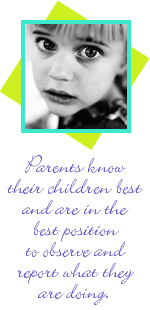|
If you have ever had concerns
about your child’s development, you are not alone. Whether you’re worried
about your child’s use of language, ability to relate to others, or any other
developmental concerns, your child relies on you to share your observations with
those who can help. Having occasional concerns is a natural part of parenting.
But when these concerns persist, it’s time to take action.
Here, we offer parents and professionals important information about healthy
development, how to monitor it, and how to know when a child has deviated from
a healthy developmental path. We focus on the key social, emotional, and communication
milestones and the red flags that may require an immediate evaluation. We try
to help work through the range of concerns and realities that many parents face,
and provide suggestions as to how parents, concerned friends, family members,
and even healthcare professionals can describe their concerns to those who can
help. Finally, we provide information about autism and other related disorders.
Being aware of what children do and learn as they develop sets the stage to let
you know if they are on the right path. Physicians are essential to help determine
this. By monitoring healthy (or typical) developmental milestones, parents and
professionals must work together to promote healthy development and to recognize
when a child needs an immediate evaluation.
Visit our developmental checklist on our
Monitoring Development web page to learn
more about the key social, emotional, and communication milestones for young
children (birth to age three). Also visit the
ASD Video Glossary to see the subtle differences between typical and delayed development in young children and spot the early red flags for autism spectrum disorder (ASD).
Parents are in the best position to observe and report what their child is doing.
Be confident you know your child better than anyone else. Trust your instincts.
When you child’s development worries you, don’t be afraid to describe these
concerns to your child’s physician. And don’t wait. Developmental delays
only develop further. Remember, you are your child’s best advocate. By expressing
your concerns to your child’s physician, you take an important step toward ruling
out or in what your child may have. The sooner you can identify a developmental
delay, the sooner your child can receive appropriate intervention to improve
the situation.
Visit our Sharing Concerns pages to learn more about how you can approach these
difficult conversations, whether between parent and physician or between family
and friends.
Of course, some concerns may end up being nothing at all, even though you worried
through many sleepless nights. Some concerns may be mild early signs of real
problems that can easily be corrected if treated right way. Still other concerns
may indeed be a more significant developmental delay or disorder for which early
and intensive intervention is the key to a successful outcome.
Back to top
Next page ==>
| 



